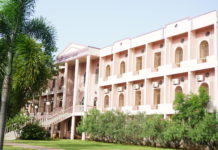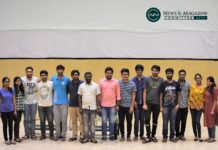A conversation with Mr. Ramshetti Prashanth, on “Network connectivity issues in campus”
Can you explain to us in layman terms what the problem is, and what the administration is doing to solve this?
As far as our institute is concerned, we are having a bandwidth of 1gbps +236 gigabits per second as given by the service provider for NITW for all departments, for both academic and hostels areas. In this, they divide separate ports and access points for Wi-Fi. There is a LAN splitter to split the network among all hostels.
The actual problem students are facing is that of authentication which wasn’t present prior to this year. In 2015 it was made mandatory for all the Government Institutes to have an IPV4 to IPV6 conversion. The difference between these two is that in IPV6, with one port you can open multiple websites or sessions. IPV6 provides more number of sessions than IPV4. The order was implemented recently when Laxmi Ma’am took charge of Data Centre. So after this, the network, websites and ports were authenticated and it was found that unwanted sites (other than academic websites) are being used more frequently. Subsequently, they started blocking students who are using more than 250 gb/day on unwanted sites like Steam, etc.
In the absence of the Director, the Director-in-charge, Jayakumar sir called for a meeting with the Secretaries and Laxmi Ma’am. He told us that he had studied the system followed in a lot of other NITs and IITs where time restrictions were imposed on the sites. For example, the movies would be faster at night than during class hours. Also, a lot of malware was found in what the students were downloading and several routers were being connected in all hostels which were undetectable to the Data Centre. Only the routers connected to the wrong port are detected, otherwise it will distribute as if it were going on a Fibre line.
Coming to issue regarding the speed, there is a restriction due to IP address in few blocks. This is due to people using routers in their rooms. It will disturb the continuous connectivity. There are server rooms in few hostels, opposite to washrooms which splits the LAN to individual rooms. If one person in a block is using a router it disturbs the entire block nearby. There is no problem in LAN speed; there was problem in upload speed.
After this, we asked for complete provision of Wi-Fi in the campus, both in academic and hostel areas. We have also been asking to provide LAN ports in Ladies’ Hostel for the past three years. You can see on the NITW website that a new tender was opened to provide more than 300 access points for providing Wi-Fi in the whole campus. Recently, Reliance Jio had given a presentation to increase the bandwidth and provide more speed. Apparently they are offering a different bandwidth. This happened at the beginning of the semester. For this they are charging Rs. 100 plus GST per student to provide Wifi and LAN to all students. Their conditions such as 1Gb per day per student per registered device, was why the process was delayed.
Currently, the problem can be solved by an alternative where each student can log in using their roll number and a set password, and they will be provided with a separate, say 10 Gb per day limit which is restricted for only downloading and not browsing.
When you are browsing through websites, you are basically downloading the contents of that particular page. So shouldn’t that come under downloadable content as well?
When you are browsing through lets say Google, it doesn’t take up much data and the browsing can be restricted separately on Google or any other search engine like Firefox. All websites that are unblocked by the government will be given access. But if there is anything like Torrents, that can bring malware into the system, those will be blocked by the data centre. There is no restriction for academic usage. You can use more than 200GB in academic terms without any problem. If you are using more than 250GB, they will check what all websites you were using. Youtube will not be restricted because a student needs entertainment plus academics. Though people spend more time on Youtube, it should be fine because at least one common entertainment sites has to be provided.
This year, proxy free internet was introduced. Why was tunneling via proxy removed?
When you have proxies, say you want to watch Youtube, there are three multiple proxies through which you can watch it. The network issue in the proxy will be less as people will be using different proxies. The traffic/network jam will be less. It wasn’t creating any problems but there is no authentication in proxies. People can hack the proxies and download anything. It was easy to access unwanted sites which are currently banned by the government. Many people told us that IITs have proxy free internet and we got representation from students that we need proxy free internet with a one-time access. To do that, we needed to convert proxy to proxy-less and then we need to give a separate username. They were completely unaware of the proxy change. The Fortinet firewall is maintaining the data in Data Centre, providing daily graphs and reports about users. So the firewall will be affected if you convert back to proxy again. There are only two viable options, continue with the status quo and blocking users of unwanted sites, or use a one time portal.
Proxy system has both its pros and cons. In that, it is easier to use unwanted sites without authentication. When we have a proxyless and OTP system, we can restrict unwanted sites and encourage academic use. When we convert to OTP it will be easier. For example, individuals who use very high data in a day, we can block him individually and report to him what sites he’s spending time on, etc.
When will the final decision for solving the issue be taken, because right now the students seem to be unhappy with what is going on. Is there supposed to be a meeting?
Sometimes when you are going for a certain plan for the betterment of the institute there might be some temporary backlash but it will definitely be beneficial in the long term. Presently also if you see the perception has been created like that because when you go browse in your room you will see that only certain sites are blocked but general sites are working. I use LAN and I don’t face any particular issue on most days. Some problems may be there and we are taking charge of all these issues. Until now we have reports of all problems that we have solved and reasons for these problems. It is just that the previous authority wasn’t on track, AMC hadn’t been paid and the authentication had not been done. But when you think about the future all these problems will not be there. As promised by the authorities, there will be interruption-free internet, proxy free and unlimited usage for academic purposes. We met with the higher authorities and again had a review meet with Director and other secretaries of Students’ Council along with all the authorities. So hopefully by the beginning of next semester there is no problem with the internet.
To implement One Time Password system they need IP and Mac addresses of all students which will consume time. We are targeting the end of this academic year to implement this. Also, the data center in-charges said it’ll take at least a year or so to provide all the access points for Wi-Fi. Director was also very keen to provide Wifi on campus and interruption free internet. The bad perception was created because of some users who had some problems but never reported it to the Data Center.
Hotstar and Netflix are also working, so you can stream movies. In one case, it was found that there were some particular server issue from Facebook with an individual’s system, while all the other sites such as Gmail, YouTube were working. My point is that we are willing to attend to issues, even if requested to at odd times.
Students allege that Data Center blocked Amazon Prime Video without intimation. What if tomorrow they block another website? What can be done to ensure communication between all parties?
We didn’t receive any reports on the usage on Prime Video; instead the site was blocked and informed to us four days after. By then a movement had started where everyone had started posting on Facebook about this issue. We enquired with the Data Centre to know if the higher authorities had asked them to do so, but they weren’t sure of this. A technician who is an outsourcee to maintain the data centre was found to have blocked it. When he was questioned about it, he refused to answer and then we directly approached the higher authorities. The authorities defended the decision by stating that Amazon Prime Video was being used at odd times and it was affecting the academics of students and many are watching movies. We argued that they should inform the student representative before making any decisions. We are representing 5000 people; if anyone faces problems they will question us. One way we could remove this miscommunication would be, to be notified prior to any changes made so that we can have another alternative solution for it.
You once talked about showing the Amazon Prime Video website’s data usage to the director, so as to get it unblocked permanently. In case the usage is more than expected, what proposal will be given from your side to resolve this issue?
The entire campus will not be using prime videos and it will definitely not exceed more than YouTube. If you look at it, suppose approximately 2000 people would have signed up for Amazon Prime and not all of them would be using Prime throughout the day. Definitely usage will be less than 2000 GB. So I think that there will be a positive result once we show the usage to the director.
Whatever the usage might be, don’t you think I should have access to prime because I pay for Prime? What is the justification from the admin’s perspective to block Prime?
Even I am a subscriber of Amazon Prime and I feel that students should be given the freedom to have access to watching movies. I feel movies are necessary while taking breaks to relieve stress. Some people may use to relax and some people may use it for entertainment. It is not wrong to watch movies, but the decision was taken so that we concentrate on studies. This decision is not correct in my opinion. There was miscommunication between the admin and the Student’s Council and hence I have called a review meet. In this review meet we will be discussing not only LAN problems but also hostels and other problems faced by the students.
This problem has lots of technical aspects to it and not everyone can understand the real issue behind this problem. Considering that, what is your message to the student fraternity?
I chose the responsibility for being a LAN representative because of my personal interest in this field. When I was General Secretary, I found many problems, like LAN not being present in all rooms in LH. The fees paid is same for boys as well as girls, but when you compare the facilities, LH has a lot more problems. When you look at the campus, it is relatively backward and the software which is used for issuing and re-issuing books is outdated. After I chose this particular role in the students’ council, I learnt many terms related to LAN issues. Similarly, to make the students understand the problems related to LAN, other campus issues and voice their opinions, we have proposed that in a month, at least for two days we have an open house session where students can directly interact with the incharges. In these sessions, students can voice their opinions and problems related to anything in campus. Hopefully, by the end of November we will be having our first open house session. I request all students to participate and play a role in shaping this campus.





